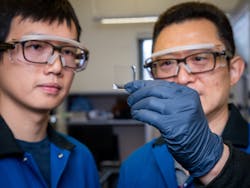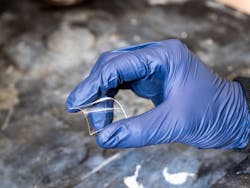Redirect Makes Recyclable Thermosets Possible
Researchers at the University of Colorado Boulder, Boulder, Colo., have developed a new reversible synthetic route that allows the creation of previously inaccessible alkyl-polycyanurate (PCN) thermosets.
According to the researchers, the new thermosets exhibit excellent film properties with high chemical resistance, closed-loop recyclability and excellent reprocessing capability.
These results show that “apparently dormant” dynamic linkages can be activated and utilized to construct fully recyclable thermoset polymers with a broader monomer scope and increased sustainability.
The work, reported in a recent issue of Nature Chemistry, proves recyclable and malleable PCNs can be prepared from two simple building blocks, and upcycling traditional aryl-PCNs to reusable monomers for alkyl-PCN synthesis is possible.
“This discovery opens new possibilities for developing novel reprocessible, repairable and closed-loop recyclable thermosets,” says Wei Zhang, lead author of the study and chair of the chemistry department at the university.
“We only conduct reactions on a bench scale at the University, but given the readily accessible starting materials, mild reaction conditions, easy workup/fabrication procedures, we believe the new methods we developed in this work are fairly easy to scale up and can plug and play with current industrial setup. The reaction vessels and conditions we are using are essentially what are being used in industry, just on a smaller scale,” he adds.
Zhang believes that commercial applications of the new process will be possible in the near future. For now, he and his team are pursuing two strands of work. First, is a systematic study to explore the substrate scope of this method and the structure-property relationship of the new materials they can make. Secondly, to investigate the feasibility of upcycling/recycling other known thermosets by activating certain dormant linkages in their networks.
About the Author
Chemical Processing Staff
Chemical Processing's editors cover industry news relevant to readers. You can email your news items to Editor-in-Chief Traci Purdum at [email protected].

